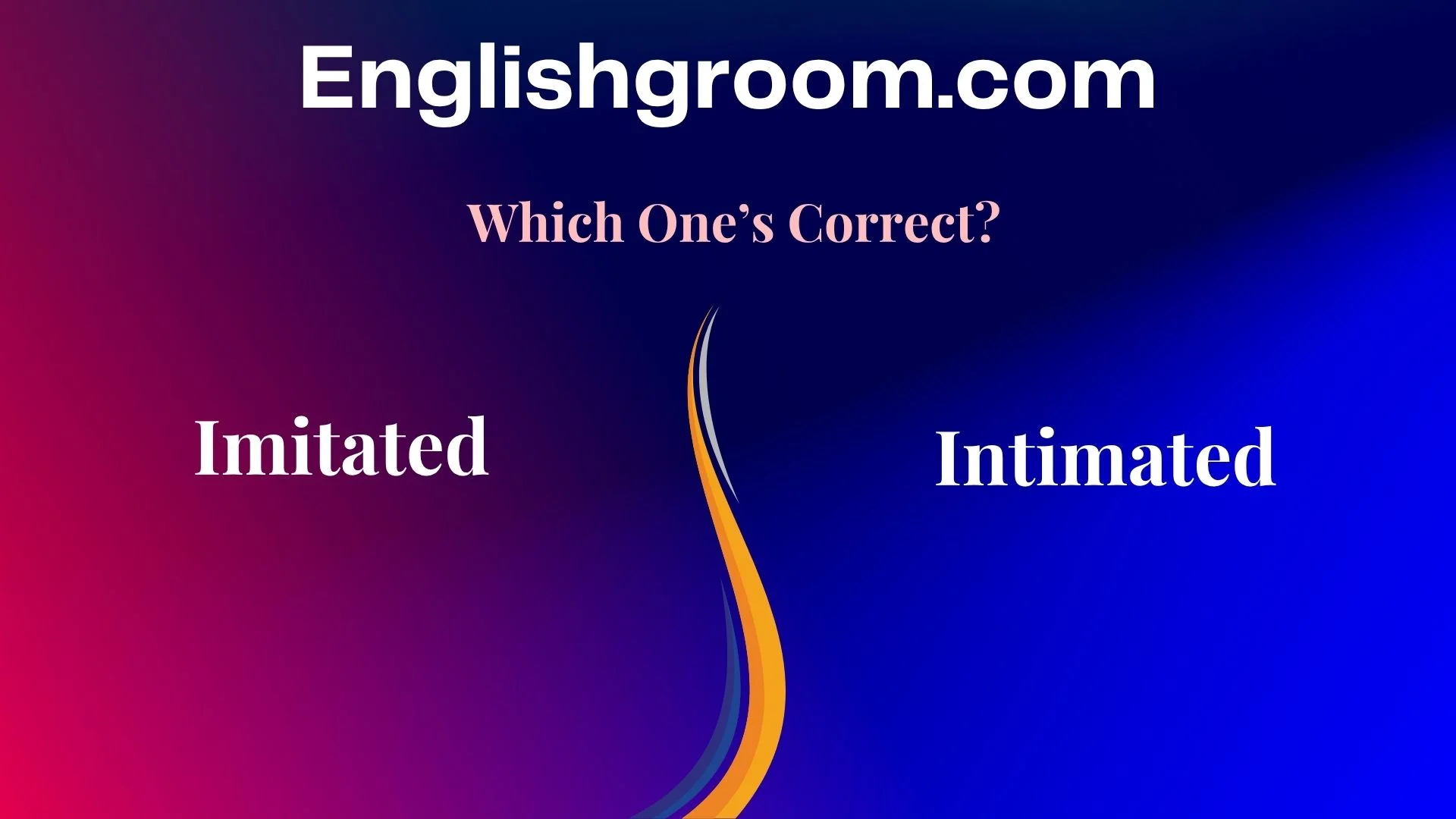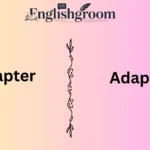Last updated on January 28th, 2026 at 04:42 pm
Language can be tricky. Some words look alike, sound alike, yet mean completely different things. “Imitated” and “Intimated” are two perfect examples. At first glance, they seem like twins—but their meanings couldn’t be further apart.
Writers, students, and even seasoned professionals often mix them up. Let’s clear the confusion once and for all and explore how to use imitated and intimated correctly, with practical examples, background, and insights you won’t find elsewhere.
Why ‘Imitated’ and ‘Intimated’ Confuse So Many People

It’s not surprising that these two words cause trouble. Both start with im- and end with -ated. When spoken quickly, they even sound similar. But their roots, meanings, and uses differ completely.
| Word | Pronunciation | Root | Meaning |
|---|---|---|---|
| Imitated | /ˈɪmɪˌteɪtɪd/ | Latin imitari | To copy or reproduce behavior or action |
| Intimated | /ˈɪntɪˌmeɪtɪd/ | Latin intimare | To suggest or hint at something subtly |
“The difference between imitated and intimated is the difference between copying someone and quietly suggesting something.”
That single sentence captures their contrast perfectly.

The Root of the Confusion: Sound-Alike, Sense-Altered
Words like affect/effect, compliment/complement, and imitated/intimated live in the “confusables” family of English. These words share phonetic similarities but diverge in meaning.
Let’s break down the phonetics briefly:
- Imitated → ih-muh-tay-tid — stress falls on the first syllable “im.”
- Intimated → in-tuh-may-tid — stress shifts slightly and the “n” introduces a subtle nasal tone.
A small change in sound creates a major change in meaning.
The Verb “Imitate”: Meaning, Origin, and Usage
Definition
Imitate means to copy, reproduce, or emulate someone or something. It can refer to behavior, art, voice, or action.
Examples:
- “Children often imitate their parents’ speech.”
- “The student imitated the teacher’s tone perfectly.”
- “Artists imitate great masters to learn their techniques.”
In short, to imitate is to mirror.
Origin
The word comes from the Latin imitari, meaning “to copy or mimic.” Over centuries, it evolved through Old French and Middle English, maintaining its essence—replicating behavior or style.
Real-Life Examples
- Everyday life: A toddler mimicking how adults talk.
- Nature: Parrots and mockingbirds imitate sounds for communication.
- Technology: AI systems imitate human reasoning through machine learning.
- Art and entertainment: Actors often imitate real figures for realism.
Positive and Negative Connotations of Imitation
Like many English words, imitate can wear two faces—one flattering, one not.
Positive Uses:
- Learning tool: Children learn by imitation.
- Tribute: “Imitation is the sincerest form of flattery.”
- Inspiration: Great writers imitate styles before developing their own.
Negative Uses:
- Lack of originality: “He merely imitated, never innovated.”
- Deception: “The painting was an imitation, not the original.”
Quote: “To copy others is necessary, but to copy oneself is pathetic.” — Pablo Picasso
Picasso reminds us: imitation can teach, but creation defines greatness.
The Noun “Imitation”: Beyond the Verb
The noun imitation refers to the act of copying or the thing that’s copied.
Examples
- “She wore imitation jewelry.”
- “That’s an imitation of Van Gogh’s painting.”
- “Learning by imitation is natural to all humans.”
Common Collocations
| Expression | Meaning |
|---|---|
| Imitation leather | Faux material mimicking real leather |
| Imitation pearls | Synthetic pearls resembling real ones |
| Imitation laughter | Forced or fake laughter |
Imitation in Psychology and Learning
Psychologist Albert Bandura’s Social Learning Theory highlights that people learn by observing and imitating others. Children model behavior after parents, teachers, and peers.
Case Study: In Bandura’s “Bobo Doll Experiment,” children who watched adults act aggressively toward a doll were more likely to imitate that behavior themselves. This proved how powerful imitation is in shaping behavior.
So, imitation isn’t just linguistic—it’s a fundamental human learning process.
The Verb “Intimate”: Meaning, Origin, and Usage
Definition
To intimate (verb) means to hint, suggest, or communicate indirectly. It’s about subtle implication, not direct statement.
Examples:
- “He intimated that a promotion was on the way.”
- “The lawyer intimated the case might be settled quietly.”
- “She intimated her desire to move abroad.”
The key here: imply, don’t declare.
Origin
The word stems from Latin intimare, meaning “to make known.” It shares roots with intimate (adjective), from intimus, meaning “innermost.”
Thus, when you intimate something, you’re revealing a thought from your innermost mind—carefully and subtly.
Tone and Nuance: The Subtle Art of Implication
While imitate is visible and external, intimate is quiet and internal.
Writers and speakers often use intimate to communicate indirectly—ideal for diplomacy, writing, and storytelling.
Examples of Tone:
- Direct: “She’s quitting her job.”
- Intimate: “She intimated that she might leave soon.”
The second sentence sounds more polished, professional, and tactful.
“Intimate” as an Adjective: The Other Meaning
Don’t confuse the verb “intimate” with the adjective “intimate.”
Adjective Definition
Intimate as an adjective means close, personal, or private.
Examples:
- “They shared an intimate friendship.”
- “An intimate setting enhanced the conversation.”
- “He revealed intimate details of his life.”
| Form | Function | Example |
|---|---|---|
| Intimate (verb) | To hint or suggest | “He intimated his concerns.” |
| Intimate (adjective) | Close or personal | “They had an intimate friendship.” |
The pronunciation also changes slightly:
- Verb: in-tuh-MAYT
- Adjective: IN-tuh-mit
Comparing ‘Imitated’ and ‘Intimated’ Side by Side
Here’s a clean comparison table to lock in the difference:
| Aspect | Imitated | Intimated |
|---|---|---|
| Part of Speech | Verb (past tense of imitate) | Verb (past tense of intimate) |
| Meaning | Copied or reproduced behavior or style | Suggested or hinted at indirectly |
| Root | Latin imitari | Latin intimare |
| Usage Context | Action, art, learning, behavior | Speech, communication, implication |
| Example | “She imitated her mentor’s speech.” | “He intimated he wasn’t satisfied.” |
| Tone | Open, visible, external | Subtle, indirect, inward |
Common Mistakes and Quick Fixes
People often misuse these words when writing fast or relying on spellcheck.
Common Mistake Examples
❌ “She intimated her sister’s accent.”
✅ “She imitated her sister’s accent.”
❌ “He imitated that the meeting was over.”
✅ “He intimated that the meeting was over.”
Easy Mnemonics
- Imitate = Act like → Both have “ate.”
- Intimate = Hint at → Both share “in,” as in inner thoughts.
Context Clue Strategy
If the action involves copying, use imitate.
If it involves suggesting, use intimate.
Practical Writing Tips
Here are some tips to remember these distinctions in your writing:
- Read aloud: The sound difference helps recall meaning.
- Associate visually: Imagine imitate as mirroring and intimate as whispering.
- Check the tone: Subtle tone = intimate; obvious act = imitate.
- Use in writing practice: Create pairs of sentences swapping both correctly.
Example Exercise
- The comedian ______ the president’s speech.
→ ✅ Imitated - The manager ______ the merger could happen soon.
→ ✅ Intimated

Language in Action: Case Studies
Case Study 1: Media Imitation
In journalism and media, imitation occurs when outlets replicate successful formats. Think of how talk shows often imitate each other’s interview styles. It’s not copying blindly—it’s modeling success.
Case Study 2: Political Intimation
In diplomacy, leaders rarely make blunt statements. Instead, they intimate intentions through tone and gesture. For example, a diplomat might intimate support without formally committing.
Case Study 3: Everyday Learning
Children imitate speech patterns long before they understand grammar. This mirrors how language evolves socially rather than academically.
Famous Quotes to Remember the Difference
“Imitation is not just the sincerest form of flattery—it’s also the starting point of creativity.” — Unknown
“What’s hinted is often louder than what’s said.” — Anonymous
Both remind us that imitating builds skill while intimating builds understanding.
5 Common FAQs about ‘Imitated’ and ‘Intimated’
What does ‘imitated’ mean?
Imitated means to copy or reproduce someone’s behavior, actions, or style. Example: “The student imitated the teacher’s handwriting.”
What does ‘intimated’ mean?
Intimated means to hint or suggest something subtly. Example: “He intimated that the deal might be canceled.”
Can ‘intimate’ mean close or personal?
Yes, when used as an adjective, intimate means close, private, or personal. Example: “They had an intimate friendship.”
Why do people confuse ‘imitated’ and ‘intimated’?
Because the words look and sound similar. Both end with -ated, and the prefixes im- and in- are easily mixed up.
How can I remember the difference easily?
Think of imitate as “mimic” and intimate as “hint.” You copy when you imitate, you suggest when you intimate.
Conclusion: Mastering Subtle Language Distinctions
Words shape clarity. Mixing up imitated and intimated can shift your meaning entirely. One is visible imitation, the other quiet implication.
Here’s the simple takeaway:
- Imitate when you’re talking about copying actions.
- Intimate when you’re talking about suggesting ideas.
Mastering small distinctions like this doesn’t just polish your English—it refines your thinking. Precision in language reflects precision in thought.
So next time you write or speak, remember: You imitate actions, but intimate intentions.

Hi! I’m Sami, a 28-year-old content writer with a love for words and storytelling. Writing has always been my way of expressing ideas, sharing knowledge, and connecting with people. I enjoy creating engaging and well-researched content—whether it’s blogs, articles, or social media posts—that not only informs but also inspires readers. My goal is to turn complex ideas into clear, creative, and meaningful pieces of writing that leave a lasting impact.



